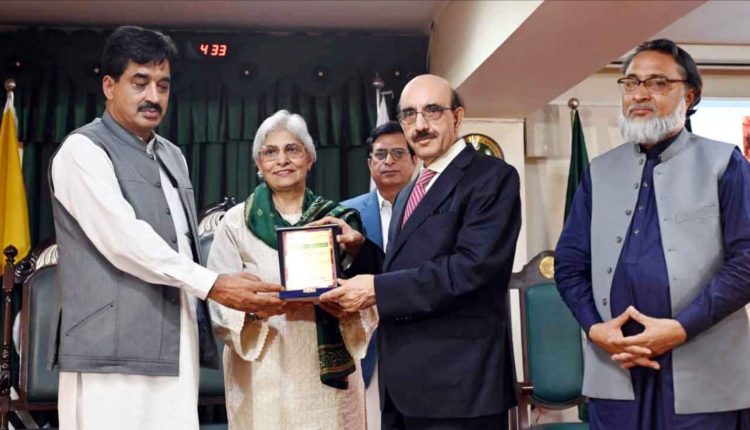Muzaffarabad: Former President of Azad Jammu and Kashmir (AJK) and seasoned diplomat Sardar Masood Khan has urged Kashmiri poets and writers to redefine the nation’s destiny by guiding society intellectually and ideologically, and shaping a strong national narrative that tells the world who the Kashmiri people are, what their identity represents, and what political aspirations they uphold.
Addressing the inaugural session of a two-day National Literary Conference jointly organized by the Pakistan Academy of Letters and the AJK Cultural Academy, Sardar Masood Khan said that at a time when Kashmir, Pakistan, and the Muslim ummah are facing multifaceted challenges and international laws are being flagrantly violated, it is imperative for men and women of letters to move from objectivity to purpose-driven creativity-and to clearly articulate the global need for justice-based societies.
He emphasized that if young writers resolve to transform the nation’s destiny through their words, positive change at both national and global levels will become inevitable.
The inaugural session was also addressed by Dr. Najeeba Arif, Chairperson of the Pakistan Academy of Letters; Dr. Raja Sajjad, Chairman of the AJK Cultural Academy; and Ahmad Atta, noted poet and former government secretary. A large number of poets, writers, and literary figures from all districts of Azad Kashmir attended the event.
Highlighting the region’s rich literary and linguistic traditions, Sardar Masood Khan said that Kashmir has always been a fertile land for language and literature, leaving deep imprints on the intellectual and cultural landscape of the subcontinent. He cited luminaries such as Allama Muhammad Iqbal, Agha Hashar Kashmiri, Shorish Kashmiri, Rasheed Amjad, Krishan Chander, and Chiragh Hasan Hasrat, who achieved distinction in Urdu literature through their unique style of writing and thoughts.
Reflecting on his own youth, Khan said he had been deeply inspired by both classical and modern literature, particularly the Progressive literature, which envisioned social and cultural revolution. He urged young writers to carry forward their elders’ unfinished dream of building a society based on justice, equality, and development.
The former president further stated that the history of Azad Kashmir is a story of courage, dignity, and sacrifice. The people of this region, he said, neither tolerated the oppression of the Maharaja in the past nor are they willing to accept India’s forcible occupation today.
He recalled that between June and October 1947, the people of the region dismantled centuries-old despitic rule and liberated a 5,000-square-mile area, establishing their own government with the objective of ensuring the freedom of the occupied parts of Jammu and Kashmir.
“October 24,” he said, “is a milestone in Kashmiri history- the day that marks our identity, when after centuries of subjugation, this land laid the foundation of its first government.
Masood Khan added that Azad Kashmir’s own constitution, legislative assembly, president and prime minister, and independent judiciary are testament to its readiness to decide its political future once the occupied region attains freedom.
Earlier, Dr. Najeeba Arif said that the Pakistan Academy of Letters has been organizing literary conferences not only in the country’s four provinces but also in Azad Kashmir and Gilgit-Baltistan, in order to integrate all regions into the national literary mainstream.
She noted that Kashmir has for centuries been a cradle of civilizations, with cultural and literary ties extending to Iran, Central Asia, and China. Paying tribute to Sardar Masood Khan’s services for Pakistan and the people of Kashmir, she said he had represented Pakistan with distinction at the international level and brought global attention to the cause of Kashmir.

